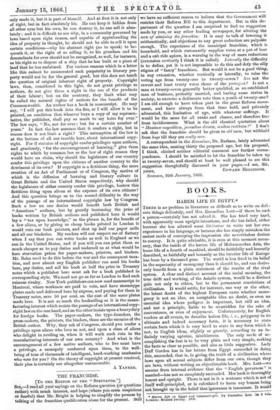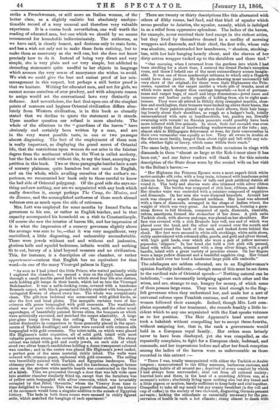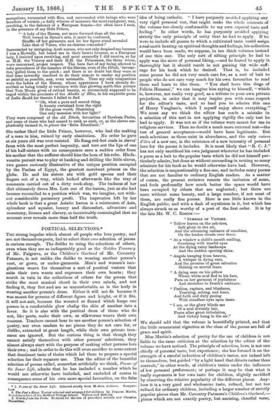BOOKS.
H A REM LIFE IN EGYPT.* THERE is no problem in literature so difficult as to write on deli - cate things delicately, and Mrs. Emmeline Lott—if there be such a person—certainly has not solved it. She has tried very hard, with apparently most upright intentions, and she has failed, either because she has allowed some //iterates?' to write out her own experience in his language, or because she has simply mistaken the easiest mode of conveying the impression she nevertheless desires to convey. It is quite advisable, it is even at this moment neces- sary, that the inside of the harem life of Mohammedan Asia, the home life of a fourth of mankind, should be faithfully and honestly described, as faithfully and honestly as the interior life of Europe has been by a thousand pens. The world is less fixed in its belief in the superiority of monogamy than it should be, and can derive only benefit from a plain statement of the results of the rival system. A clear and distinct account of the social meaning, the true drift and working, of the Asiatic system, would be a distinct gain not only to ethics, but to the permanent convictions of civilization. It would settle, for instance, one way or the other, the latent doubt of the highest European caste whether mono- gamy is not an idea, an acceptable idea no doubt, or even an essential idea where pedigree _is important, but still an idea, and not a principle, liable to be overridden for the sake of convenience, or even of enjoyment. Unfortunately, for English readers at all events, to describe harem life, i. e., polygamy in its ultimate and indeed necessary form, it is necessary to state certain facts which it is very hard to state in any form which is not, to English ideas, slightly or gravely, according to an in- finitely varying opinion, mischievous. The only mode of ac- complishing the feat is to be very plain and very simple, making the facts as clear as possible, and also as little suggestive. Lady Duff Gordon has in her letters from Egypt succeeded in doing this, succeeded, that is, in giving the truth of a civilization whose laws upon all sexual subjects differ from our own, though they are laws, without writing an objectionable book. Mrs. Lott—we assume from internal evidence that the " English governess " is married—has not so completely succeeded. Her book is thoroughly honest and upright. There is not in it a sentence which is not of itself well-principled, or is calculated to harm any human being not brought up in the belief that ignorance is innocence. It would • Harem Lye in Egypt and amatatilinople. By Emmeline Lott. In 2 vols. London: Richard Bentley. 180.
strike a Frenchwoman, or still more an Italian woman, of the better class, as a slightly realistic but absolutely unobjec- tionable record of a very unusual and therefore very valuable experience. It is a coarse book nevertheless, one well worth the reading of educated men, but one which we should by no means recommend for households indiscriminately. The authoress, as we have said, is clearly honest, and desirous only to state facts, and has a wish not only not to make those facts enticing, but to make them as unsavoury as she well can, but she does not know precisely how to do it. Instead of being very direct and very simple, she is very plain and not very simple, but addicted to shrouding statements quite needful to her objects in language which arouses the very sense of annoyance she wishes to avoid.
We wish we could give the best and easiest proof of her mis- management in this respect, but perhaps a still better proof is that we hesitate. Writing for educated men, and not for girls, we cannot accuse ourselves of over prudery, and with adequate reason to assign would set the conventional laws very distinctly at defiance. And nevertheless, the fact that upon one of the simplest points of manners and hygiene Oriental civilization differs abso- lutely from Western civilization, is in this book so clumsily stated that we decline to quote the statement as it stands. Upon another question our refusal is more absolute. The whole of the allusions to the " guardians of the harem" have obviously and certainly been written by a man, and are in the very worst possible taste, in one or two passages almost disgusting. The fact of the employment of these men is really important, as displaying the grand secret of Oriental life, that the restrictions upon women do not arise in the faintest degree from the sentiment which in the West is called modesty, but the fact is sufficient without the, to say the least, annoying re- petition in this book. Two or three paragraphs besides have a sort of nursery plainness, quite harmless but not usual in English, and on the whole, while availing ourselves of the author's ex- perience, we recommend her book only to those careful to know the bad side of Oriental polygamy. Of the good side she says no- thing and saw nothing, nor are we acquainted with any book which really describes it, except perhaps The Camp, the Mission, and the Zenana, and the accomplished authoress of those much abused volumes errs as much upon the side of reticence.
Mrs. Lott was employed for some months by Ismael Pacha as governess to his son, or rather as English teacher, and in that capacity accompanied his household on a visit to Constantinople. Of course she saw the interior of harem life, and her impression of it is what the impression of a nursery governess slightly above the average was sure to be,—that it was very magnificent, very uncivilized, a little disgusting, and unbearably uncomfortable.
There were jewels without end and without end jealousies, glorious halls and squalid bedrooms, infinite wealth and nothing fit to eat, luxury of a kind beyond measure and no civilization. This, for instance, is a description of one chamber, or rather apparternent—curious that English has no equivalent for that word—in one of the many Viceregal palaces in Egypt.
"As soon as I had joined the little Prince, who waited patiently while I explored the chamber, we opened a door on the right hand, passed through a small marble paved hall in which stood font- life-size statues, each holding gilt lamps in their hands, which led us into the Viceregal Bedchamber. It was a noble-looking room, covered with a handsome Brussels carpet, with black ground and thickly studded with bouquets of variegated flowers of almost every hue. The whole was scrupulously clean. The gilt-iron bedstead was surmounted with gilded knobs, as also the foot and head plates. The mosquito curtains were of fine crimson silk gauze bespangled with gold crescents. The washhand- stand was of pure white marble, with ewer basin, and the other usual appendages, of beautifully painted Sevres china, the bouquets on which were artistically executed, and matched the carpet admirably. A large pier-glass hung down from the ceiling. The divan (which was rather diminutive in comparison to those generally placed in the apart- ments of Turkish dwellings) and chairs were covered with crimson silk bespangled with gold crescents. The toilet-table, on which were placed His Highness's toilet requisites, all of solid gold, inlaid with most valuable precious atones, was covered with a similar cloth. The ebony cabinet was inlaid with gold and costly jewels, on each side of which stood two silver branch candelabras holding a dozen transparent coloured wax candles ; and in the centre was placed His Highness's jewel casket, a perfect gem of the same material, richly inlaid. The walls were covered with crimson paper, embossed with gold crescents. The ceiling was beautifully painted with Turkish and Egyptian landscapes. The chimney piece was of white marble, and the handsome, elegant bronze stove on the spotless white marble hearth was constructed in the form of a kiosk. Then we proceeded through a door that was left wide open into another chamber similarly fitted up, except that the furniture was of yellow satin bespangled with silver crescents, which was invariably occupied by that .tkbal, favourite,' whom the Viceroy from time to time delighted to honour. This was the guests' chamber, and the history of its occupants would form a singular addition to the annals of Egyptian history. The beds in both these rooms were encased in richly figured satin, which matched the hangings of each apartment."
There are twenty or thirty descriptions like this alternated with others of filthy rooms, bad food, and that kind of squalor which seems peculiar to Asiatics, the squalor, namely, which is indulged in as a relief from oppressive splendour. The ladies of the harem, for example, never received their lord except in the richest attire, but they lived by themselves dressed in a medley of morning wrappers and diamonds, and their chief, the first wife, whose rule was absolute, superintended her laundresses, " shoeless, stocking- less, with her hair hanging loosely about, and the sleeves of her dirty cotton wrapper tucked up to the shoulders and there tied."
" One morning, when I returned from the gardens into which I had been strolling for a short time, I entered the Grand Pacha's reception room, and there I beheld one of the most extraordinary scenea imagin- able. It was one of those nondescript tableaux to which only a Hogarth could have done justice. My feeble pen-drawing must necessarily fall very short of the original ; for there were their Highnesses the Prin- cesses, squatted on the carpet amidst a whole pile of trunks, most of which were much deeper than carriage imperials—a host of portman- teaus and carpet bags, of small and large dimensions—jewel cases and immense red leather sacks capable of holding from six to eight mat- tresses. They were all attired in filthily dirty crumpled muslin; shoe- less and stockingless, their trousers were tucked up above their knees, the sleeves of their paletots pinned up above their elbows, their hair hang- ing loosely about their shoulders, as rough as a badger's back, totally unencumbered with nets or handkerchiefs, but, pardon me, literally swarming with vermin ! no Russian peasants could possibly have been more infested with live animals. In short, their tout ensemble was even more untidy than that of hardworking washerwomen at the tubs ; nay, almost akin to Billingsgate fishwomen at home, for their conversation in their own vernacular was equally as low. They all swore in Arabic at the slaves most lustily, banged them about right and left with any mis- sile, whether light or heavy, which came within their reach."
The same lady, however, revelled on State occasions in rings with diamonds in them " almost as large as the Koh-i-noor since it has been cut," and our fairer readers will thank us for this minute description of the State dress worn by the second wife on her visit to the Sultan's harem:—
" Her Highness the Princess Epouse wore a most superb thick white moire-antiqtle silk robe, with a long train, trimmed with handsome point Alencon lace, having rich ruches' of tulle and pink artificial daisies all round it. The body and sleeves were also trimmed with silver ribbon and daises. The bertha was composed of rich lace, ribbons, and daises. Her slender waist was encircled with a ceinture composed of sapphires and diamonds. On her arm she wore diamond bracelets: Around her neck was clasped a superb diamond necklace. Her head was adorned with a tiara of diamonds, arranged in the shape of Indian wheat, the weight of which was very great. An immense branch, forming a gera- nium flower in full blossom, composed of opals, diamonds, emeralds, rabies, amethysts, formed the stomacher of her dress. A pink satin Turkish cloak, with sleeves and cape, was placed on her shoulders. Her face was covered with a rich Brussels lace veil, one end of which was placed over the head, and the other end crossed over the mouth and nose, passed round the back of the neck, and tucked down behind the cloak. Her feet were encased in white silk stockings, white satin shoes, richly embroidered with coloured silks, pearls, and gold and silver thread, with high gold heels, over which she wore a pair of yellow morocco papooshes, slippers.' In her hand she held a rich pink silk parasol, lined with white satin, trimmed with a deep silver fringe, with a gold handle, inlaid with a groat variety of precious stones. On her fingers were a large yellow diamond and a beautiful sapphire ring. Her Grand Eunuch held over her head a handsome large pink silk umbrella."
The odalisques are seldom educated, are in an Englishwoman's opinion fearfully indelicate,—though some of this must be set down to the cardinal rule of Oriental speech—" Nothing natural can be indelicate,"—are incessantly intriguing against each other and the wives, and are, strange to say, hungry for money, of which some of them possess large sums. They were kind enough to the Eng- lish governess when they understood her, and made her a sort of universal referee upon Frankish customs, and of course the lower women followed their example. Indeed, though Mrs. Lott com- plains repeatedly of her treatment, she records frankly a little in- cident which to any one acquainted with the East speaks volumes as to her position. The Heir Apparent's head nurse never took a bakshifsh without compelling her to accept three-fourths, without assigning her, that is, the rank a gouvernante would bold in a European royal family.. Her orders seem latterly never to have been disobeyed, yet she was compelled, as she repeatedly complains, to fight for a European chair, bedstead, and commode, and her impressions before and after her frank reception among the ladies of the harem were as unfavourable as those recorded in this extract :-
"There I was, totally unacquainted with either the Turkish or Arabia tongues ; unaccustomed to the filthy manners, barbarous customs, and disgusting habits of all around me ; deprived of every comfort by which I had always been surrounded ; shut out from all rational society; hurried here and there, in the heat of a scorching African sun, at a moment's notice ; absolutely living upon nothing else but dry bread and a little pigeon or mutton, barely sufficient to keep body and soul together. Compelled to take all my meals but my scanty breakfast (a dry roll and cup of coffee) in the society of two clownish, disgusting, German peasant servants ; lacking the stimulants so essentially necessary for the pre- servation of health in such a hot climate ; stung almost to death with
mosquitoes, tormented with flies, and surrounded with beings who were breeders of vermin ; a daily witness of manners the most repugnant, nay, revolting, to the delicacy of a European female—for often have I seen, in the presence of my little Prince, "A lady of the Harem, not more forward than all the rest, Well versed in Syren's arts, it must be confessed, Shuffle off her garments, and let her figure stand revealed Like that of Venus, who no charms concealed !'
Surrounded by intriguing Arab nurses, who not only despisedme because I was a Howadji, but hated me in their hearts because, as a European lady, I insisted upon receiving, and most assuredly I did receive, so far as H.R. the Viceroy and their H.H. the Princesses, the three wives, were concerned, proper respect. The bare fact of my being allowed to take precedence of the inmates of the Harem, even of the Abals, favour- ites,' galled them to the quick ; and there is no doubt but they were at that time inwardly resolved to do their utmost to render my position as painful as possible, nay, even untenable. Then my only companions were the ladies of the Harem, whose appearance I have already de- scribed as being totally at variance with that glowing myth-like picture that Tom Moore gives of retired beauty, so erroneously supposed to be caged within the precincts of the Abodes of Bliss, in his exquisite poem of Lake Bookh for therein I failed to find
" 'Oh, what a pure and sacred thing Is beauty curtained from the sight Of the gross world, illumining One only mansion with her light!'
They were composed of the old Ikbals, favourites of Ibraham Pacha, and some of those who had ceased to rank as such, or, as the slaves em- phatically termed it, to please the 'Baba Efendimir.'"
She rather liked the little Prince, however, who had the making of a man in him, ruined by early absolutism. No order he gave at six years old was ever resisted. He flung red-hot coals in slaves' faces with the most perfect impunity, and tore out the lips of one of his half-sisters with no consequence save a sudden order from his mother that the sufferer should kiss the hem of his robe. His fa- vourite pursuit was to play at banking and drilling the little slaves, two games curiously illustrative of the unique position occupied by the Paellas of Egypt, the greatest merchant princes on the globe. He and his sisters ate with gold spoons and their fingers out of a tray, which looked afterwards like the tray of remnants carried out of a dirty cook-shop. The badness of her diet ultimately drove Mrs. Lott out of the harem, just as she had become reconciled to a position which was, we imagine, not with- out considerable pecuniary profit. The impression left by her whole book is that a great Asiatic harem is a microcosm of Asia, splendour and squalor, luxury and discomfort, adventure and monotony, licence and slavery, so inextricably commingled that no account ever reveals more than half the truth.
































 Previous page
Previous page